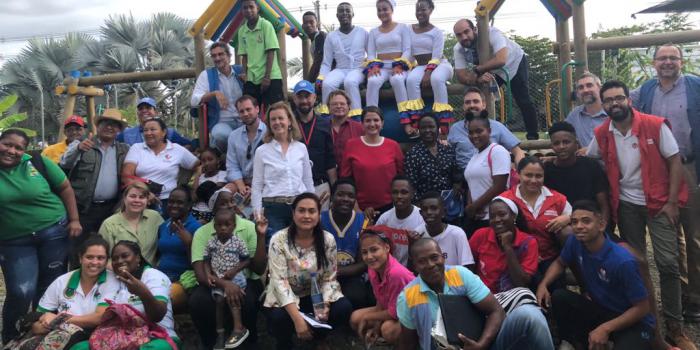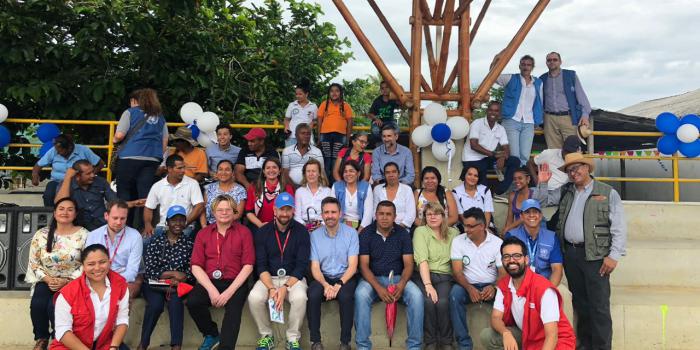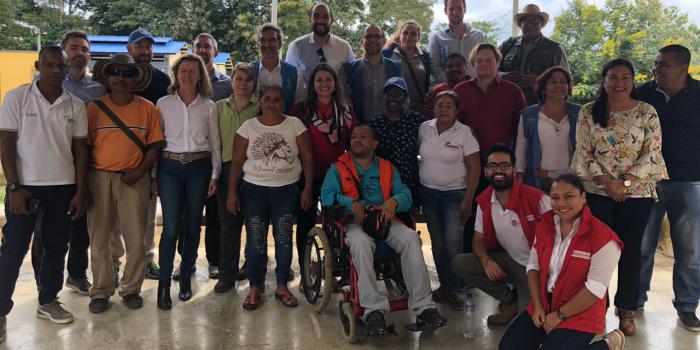
Collectives of Urabá showed progress to the international community
International collaborators who contribute to the collective reparation processes in the country made a tour of Pueblo Bello, in Turbo, and la Chinita, in Apartadó, to know the impact of the projects in these communities.



A commission of cooperating organizations toured the subjects of collective reparation of Pueblo Bello, in Turbo, and La Chinita, in Apartadó. It was an opportunity for the collectives to make known to international bodies the experiences and advances obtained through the process of collective reparation, partly supported by these resources.
Delegates from Canada, Norway, Sweden, Ireland, England and Tanzania and representatives of the United Nations Peacebuilding Fund were in the communities. They were accompanied by the deputy director of collective reparation of Victims Unit, Juanita Ibáñez, and the director of the territorial Urabá Darién, Elizabeth Granada Ríos.
The tour began in Pueblo Bello, a village located north of Urabá. There, the promotion committee of the Comprehensive Collective Repair Plan highlighted the Unit's support in disseminating its history.
"To thank Unit for having given us the opportunity to go to the capital cities to tell the story of Pueblo Bello through art, because many people came here. They have come to check our past. The Unit helped us to make it visible not only at the national level but beyond the borders. That is super important to re-rehabilitate, "said Ramón García, of the impulse committee.
The townspeople accompanied each step of the delegation with a narration of the memory that keeps each emblematic place of the township, as the memory wall and the facilities of the Community Social Center Remanso de Paz, among other areas of resignification in which they share as a community.
"One of the measures includes the revitalization of economy of the collective subject of Pueblo Bello. The project started in 2014, aimed at producing banana slices, even for the international market. This is how we visualize it in its moment. After trying other products, we are located in the banana plantation, the basis of the economy of the territory "explained to the delegation Edward Rivera, also a member of the impulse committee.
The members of this group thanked the support received from these international organizations, specifically in the execution of these productive forms. However, they shared other challenges and projections in the medium term, in which they hope to continue counting on this support. "Export has been the goal, but it has not been easy". Due to changes in regulations and new requirements for products "we have had to invent other ways to market," adds Rivera, who expresses himself fully in the matter.
At the end of the tour of that district, they dismissed the international delegates with a play, in which the young people recreated the resurgence of values such as forgiveness, peace, love, opening a new path for this community.
Juanita Ibañez, deputy director of collective reparation in the Victims Unit, highlighted the work that has been done with this subject of collective reparation and thanked alliances with international entities to carry out the projects. "Through these alliances and other organizations we can reach many more," said the official, who recalled that at this time there are more than 620 subjects of collective reparation recognized.
In La Chinita
Upon their return to Apartadó, the members of the delegation were received by the Chinita group, who took them to see the place where the massacre of January 23, 1994 took place. They were then presented with the facilities of the newly remodeled communal house, where the youth clubs contagiously cheered the attendees.
"More than talking about the 19 activities that have been implemented as part of the collective reparation plan, it is very important for us to talk about a subject of collective reparation victims of an event that marked us as a territory," said Elizabeth Granada Ríos, director territorial unit, who also highlighted the process of individual reparation that has been followed in the population.
"This subject is characterized because he has worked with young people to replicate their history and not repeat it. They have done it through workshops, training and culture. Thus, not only has it been possible to strengthen the infrastructure but also to make an investment in the human resources that our young people are, "added Granada Ríos.
At the end of the day, Marc André, delegate of the United Nations Peacebuilding Fund, thanked the communities for receiving them. "Thank you very much for telling us your story. This helps us understand what they have lived, what they live today and how in the future we can continue supporting them, "he said.






